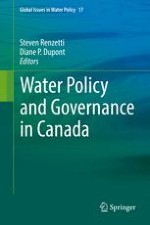2017 | OriginalPaper | Buchkapitel
8. Transcending Borders Through Postcolonial Water Governance? Indigenous Water Governance Across the Canada-US Border
verfasst von : Emma S. Norman, Karen Bakker
Erschienen in: Water Policy and Governance in Canada
Aktivieren Sie unsere intelligente Suche, um passende Fachinhalte oder Patente zu finden.
Wählen Sie Textabschnitte aus um mit Künstlicher Intelligenz passenden Patente zu finden. powered by
Markieren Sie Textabschnitte, um KI-gestützt weitere passende Inhalte zu finden. powered by
